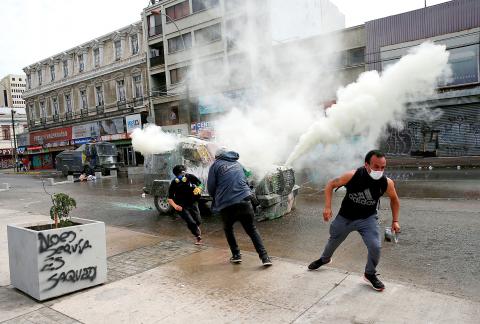Chilean President Sebastian Pinera yesterday ended a state of emergency that lasted more than a week amid mass protests, but demonstrations continued nonetheless.
The decision to lift the decree at midnight, just two days after more than 1 million people took to the country’s streets demanding economic and political change, comes after the equally unpopular week-long nighttime curfews ended on Saturday.
Authorities imposed the state of emergency and curfews after Chile was rocked by its worst civil unrest in decades. What originated as a student protest against a modest hike in metro fares quickly got out of control as demonstrations turned deadly.

Photo: Reuters
A message on the presidency’s official Twitter account said the state of emergency, which had seen 20,000 soldiers and police deployed on the streets, would end “in all the regions and towns where it was established.”
This measure came a day after Pinera said he had “asked all ministers to resign in order to form a new government.”
“We are in a new reality,” Pinera said on Saturday. “Chile is different from what it was a week ago.”
However, demonstrations continued on Sunday as thousands of people marched to the seat of Congress in Valparaiso, 120km west of the capital, Santiago.
“The strength of the social movement that has taken over the streets has been its ... peaceful and constructive character,” Valparaiso Mayor Jorge Sharp said.
About 100,000 people participated in the march, which ended in isolated clashes between demonstrators and police, Sharp said.
The government has been struggling to craft an effective response to the protests and a growing list of economic and political demands that include Pinera’s resignation.
A group of about 1,000 cyclists stopped outside the presidential palace in Santiago on Sunday, chanting: “Listen up Pinera: Go to hell.”
About 15,000 people gathered peacefully in the capital’s O’Higgins Park, police said.
The breadth and ferocity of the demonstrations appeared to have blindsided the government of Chile — long one of Latin America’s richest and most stable countries. Demonstrators are angry at Chile’s social model, low salaries and pensions, high healthcare and education costs, and the gap between rich and poor.
Pinera, who assumed office for a second time in March last year, had already shuffled his Cabinet twice in 15 months as doubts grew about the nation’s slowing economy and his leadership.
He offered a raft of measures earlier this week aimed at calming the public ire, including an increased minimum wage and pensions, some reductions in healthcare costs and a streamlining of parliament.
“These measures aren’t enough, even though they’re an important step in the people’s demands,” said electrical engineer Eduardo Perez.
By Saturday afternoon, the military presence in Santiago had been already visibly reduced.
There were fears that continuing protests could put at risk the APEC trade summit in Santiago from Nov. 16, but the government said on Thursday that it would go ahead.

POLITICAL PRISONERS VS DEPORTEES: Venezuela’s prosecutor’s office slammed the call by El Salvador’s leader, accusing him of crimes against humanity Salvadoran President Nayib Bukele on Sunday proposed carrying out a prisoner swap with Venezuela, suggesting he would exchange Venezuelan deportees from the US his government has kept imprisoned for what he called “political prisoners” in Venezuela. In a post on X, directed at Venezuelan President Nicolas Maduro, Bukele listed off a number of family members of high-level opposition figures in Venezuela, journalists and activists detained during the South American government’s electoral crackdown last year. “The only reason they are imprisoned is for having opposed you and your electoral fraud,” he wrote to Maduro. “However, I want to propose a humanitarian agreement that

ECONOMIC WORRIES: The ruling PAP faces voters amid concerns that the city-state faces the possibility of a recession and job losses amid Washington’s tariffs Singapore yesterday finalized contestants for its general election on Saturday next week, with the ruling People’s Action Party (PAP) fielding 32 new candidates in the biggest refresh of the party that has ruled the city-state since independence in 1965. The move follows a pledge by Singaporean Prime Minister Lawrence Wong (黃循財), who took office last year and assumed the PAP leadership, to “bring in new blood, new ideas and new energy” to steer the country of 6 million people. His latest shake-up beats that of predecessors Lee Hsien Loong (李顯龍) and Goh Chok Tong (吳作棟), who replaced 24 and 11 politicians respectively

Young women standing idly around a park in Tokyo’s west suggest that a giant statue of Godzilla is not the only attraction for a record number of foreign tourists. Their faces lit by the cold glow of their phones, the women lining Okubo Park are evidence that sex tourism has developed as a dark flipside to the bustling Kabukicho nightlife district. Increasing numbers of foreign men are flocking to the area after seeing videos on social media. One of the women said that the area near Kabukicho, where Godzilla rumbles and belches smoke atop a cinema, has become a “real

‘WATER WARFARE’: A Pakistani official called India’s suspension of a 65-year-old treaty on the sharing of waters from the Indus River ‘a cowardly, illegal move’ Pakistan yesterday canceled visas for Indian nationals, closed its airspace for all Indian-owned or operated airlines, and suspended all trade with India, including to and from any third country. The retaliatory measures follow India’s decision to suspend visas for Pakistani nationals in the aftermath of a deadly attack by shooters in Kashmir that killed 26 people, mostly tourists. The rare attack on civilians shocked and outraged India and prompted calls for action against their country’s archenemy, Pakistan. New Delhi did not publicly produce evidence connecting the attack to its neighbor, but said it had “cross-border” links to Pakistan. Pakistan denied any connection to